A Brief History of Chinese Independent Documentaries
Documentary is the memory of the times. As long as someone is still telling it, history will not be completely erased. They try to control history and thus control the future, and all we can do is to tell our own stories as much as possible. I shot the first, middle and second films for "A Brief History of Chinese Independent Documentaries". This article is the transcript of the three-issue video, and the transcript is slightly edited from the content of the video.
The second stage: before 2000-2011, "Practice Society", independent film festival, citizen video https://youtu.be/UWd7maIofhs
The third stage: 2012-present, the "darkest hour" of independent films after Xi Jinping's presidency
Looking at the three stages, it is not difficult to find that each era has become a "golden age" in the minds of the next generation due to the regression of the creative environment and social environment, and each decade has become the best decade in the future. .
definition:
"Chinese independent films" are not "American independent films" that are independent of the Hollywood production system and capital. The "independence" of Chinese independent films is more of a spiritual and ideological independence.
"Independent movies" are not all "banned movies". Prohibition is a top-down official behavior, and independence is more of a self-definition, just like not everyone on the rivers and lakes is a wanted criminal.
There is no clear reference to "independent film". Even within independent films, there is a relatively broad definition by Mr. Zhang Xianmin: "If a creator thinks his film is an independent film, then others don't have to refute it." ① There are also "Independent Films". A more fundamental standard such as the Oxtail Film Manifesto ②, the Oxtail Film Manifesto rejects film censorship from any aspect and requires films to faithfully express their own thoughts and positions. Here we do not make a specific distinction between the concepts of "independent film" and "independent documentary". All films with an independent spirit outside the mainstream ideology are within the scope of our discussion.
1. The first stage: 1988-1999 Video democratization brought about by documentary and DV within the system
Generally speaking, most audiences will regard Wu Wenguang's documentary "Wandering Beijing", which was shot in 1988 and edited in 1990, as the first Chinese independent documentary. If the scope of documentaries is expanded, video artist Zhang Peili's "30*" in 1988 30" may be an earlier starting point for Chinese independent documentaries. However, there are also scholars3 who proposed that director Lu Le started filming in 1986 and edited the documentary "Nujiang, a Forgotten Canyon" in 1989. Like its name, it is also a "forgotten" independent documentary. Regardless of the succession, the three films "Wandering Beijing", "30*30", or "Nujiang" were all born in the late 1980s and early 1990s. "Today", "Sorrow of the River", the 1985 New Wave Art, the Yuanmingyuan Painter's Village - the cultural trend of thought. The cultural atmosphere in the 1980s was more open than it is today, and the political environment was more relaxed than today. Although the June 4th crackdown killed the spark in the cultural world, those who have seen Camus, Sartre, and Nietzsche , How can you be willing to live in a cage ?
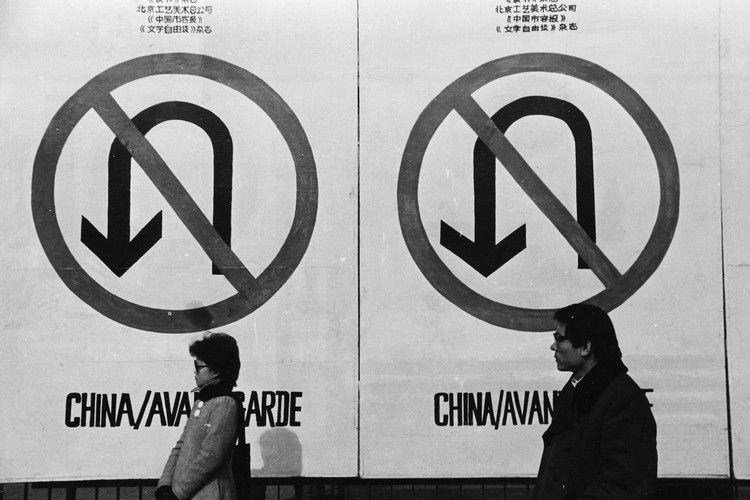
In 1993, Jiang Yue filmed "The Other Shore". In the first half of the film, Director Jiang Yue filmed Mou Sen and a group of students from the film academy's performance training class, and rehearsed a pioneering drama called "The Other Shore", which received repercussions after its premiere. It is quite good, with audiences, academics and critics all giving it high marks. There is a kind of idealism left over from the 1980s in the process of performance and rehearsal, as if through such a play, the audience and the actors can reach the utopia on the other side. But after the end of the seven performances and the advanced class, some of these students became waiters and some sold instant noodles. When they returned to the cruel society and real life, they found that the constructed "other side" was not exist. Two unwilling students returned to their hometown in Hebei and rehearsed another drama. They invited Mou Sen and nearby fellows for the premiere. In the vast world in rural Hebei, a group of fellow villagers stared blankly at the two students, with "ideal" and "heaven" coming out of their mouths. "The Other Shore" directed by Jiang Yue not only filmed "The Other Shore" as a drama, but also filmed the other shore of life, and filmed the signified and signifiers of the "other shore". "It's just a noun. This kind of confusion about reality and the "other shore" is not only the confusion of Mou Sen and the students in the film, but also the confusion of the whole China after 1989 about the future.
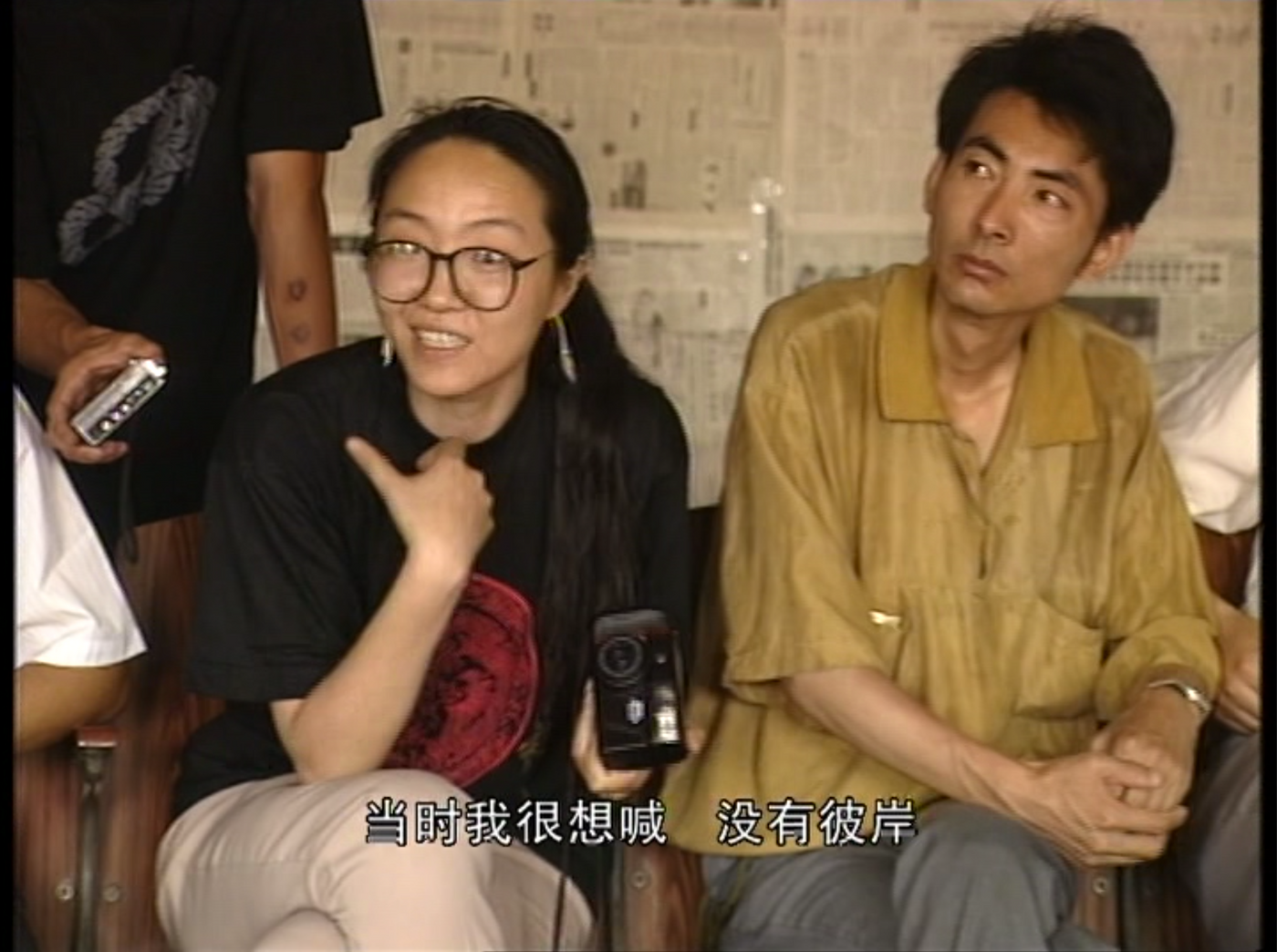
Although the early independent documentaries occasionally clashed with regulations and systems, on the whole they did not have too strong ideological appeals, and there was no obvious institutional criticism. "The reactionary, trying to tell "the people's own stories" . Unlike earlier independent documentaries, most independent filmmakers today would not choose or even imagine cooperating with the system. They consider it to be "recruitment" and a certain degree of "complicity." There are two reasons for this split. One is that the post-totalitarian system compresses the space of expression even tighter. The "bottom line" in the past was that you couldn't scold me. None; the second is the cost of filming the documentary. In an era when digital images have not yet become popular, let alone prosperous, cameras with tens of thousands of cameras are the natural barrier between creators and images. Even if creators can afford to rent cameras, tape/film and hourly post-production equipment is an insurmountable divide for creators. Therefore, in the early days, most of the creators of independent documentaries had identities in the system at the same time. Time, Liang Bibo, Chen Xiaoqing and others were all the choreographers of local TV stations, Kang Jianning was even the deputy director of Ningxia TV station; Such authors, although they do not work within the system, are also inextricably linked with the television system. Documentaries such as "No. 16 Barkhor South Street", "Shipwreck", and "Three Gorges" are all funded by CCTV. of.
The emergence of DV is subversive. It has entered the public's field of vision with a "miniaturized, low-cost, high-quality" image, and then broke the hegemony of the system based on economics - Yang Lina's "Old Man", Wang Bing's "Tiexi District", Jiang Zhi's "Forefinger", Zhao Liang's "Paper Airplane"—in a sense, the emergence of DV marks the arrival of video democratization. The so-called video democratization not only refers to more Many people have the possibility to create images, which means that after people are exposed to more images shot by DV, the way of viewing and understanding the world will change subtly. However, DV is not the savior of the new world, even if "everyone can afford a ballpoint pen, but our literature has not seen much progress; online literature has surpassed the discourse power of publishing and publishing, but it seems that it has not produced much. A masterpiece.”4
Introduced to China earlier than DV, and also having a greater impact on the creation of independent documentaries is “direct film”. "The general documentary filming method was introduced to China through the introduction of Wiseman and Shinsuke Ogawa by Professor Lin Xudong of Beijing Broadcasting Institute. Under the influence of Wiseman, Duan Jinchuan filmed "The Square" and "No. 16 South Barkhor Street". The latter is the first documentary in China to win the Grand Prix of the French Real Film Festival. , including holding meetings, catching thieves, attending party classes, and mediating neighborhood disputes. According to Duan Jinchuan’s recollection, he didn’t even turn on the camera for the first two months in the neighborhood committee. He didn’t press the power button until the subject turned a blind eye to the machine. This way of shooting is the reality of “direct movie”.
It is different from "Direct Movie". "Real Movies" pursues the "reality" after taking the initiative to intervene - if you are drinking coffee on a street corner, and the big brother who has never met the next door deliberately splashes you with coffee, then what you care most about is obviously why the big brother splashed you for no reason, not Whether the liquid flowing on the body is a latte or a cappuccino, it doesn't matter whether the man's left hand is holding a camera - this is another kind of "reality" that the "real movie" tries to construct. All over the world, "real movies" take on different forms due to different national conditions and cultures. In France, it is "Summer Chronicle", in Italy it is "Encyclopedia of Sexual Affairs", and under the influence of "socialism with Chinese characteristics", The success of "Beijing is very windy" in 1999 - Director Ju Anqi held a DV on the streets of Beijing and asked everyone, "Do you think Beijing is windy?" The political consciousness of Beijing citizens obviously did not let Ju Anqi Disappointed, some people asked the director after hearing the question, "Aren't you Taiwanese spies?" The director then sang with the subjects and talked about the surveillance society from Maslow's pyramid of needs.
2. The second stage: 2000-2011 From "Practice Society" to Independent Film Festival
If the emergence of DV has provided more possibilities for independent documentary filming, then the emergence of "Practice Society" has provided more space for independent documentary screening. "Practice Society" was established on April 1, 2000. Its founder is Yang Zi, and most of the main members are students of Beijing Film Academy. At the beginning of its establishment, the "Practice Society" paid more attention to creation, but it was not easy to shoot short films and the output was not high, so it gradually became a screening-based organization. In addition to Chinese independent films, the "Practice Society" also shows some classic literary films such as Tarkovsky and Bergman. In the era when the Internet was not developed, the source of the film mainly depended on physical DVD for circulation, and the source of the "Practice Society" also had a legendary story. This Mr. Pan, who studied law, engaged in logistics and real estate, had a bright future, but by accident, he became a fortune teller. Pan Jianlin discovered that his master's main business was fortune-telling, and he was a movie fan as an amateur. His home was full of DVDs, not only Abbas and Jia Zhangke, but also many Chinese independent films. "Penny" was hit by a dream, and slowly became an independent director Pan Jianlin.
Not only fortune-tellers, Pan Jianlin, Yang Zi and Beijing's "Practice Society" were "infected" by independent films, but also "101 Film Group" in Shanghai, "Freedom Film" in Shenyang, and "Yingying Club" in Shenzhen were "bewitched" at the same time. ". Ou Ning, the founder of "Yuanyinghui", fell in love with the evil of independent films, and together with Cao Fei, he created many experimental documentaries. "Sanyuanli" uses the form of an urban symphony to shoot an urban village that is being renovated in Guangzhou. It is accompanied by some electronic music. The editing is a bit "ghost animal". The perspective of the camera is also very interesting, and the audience can feel the author's physicality. The most distinctive feature is the production method of the film. "Sanyuanli" was not shot by Ou Ning or Cao Fei alone, but a collective creation of Yuanying Club. The power of images is no longer concentrated in the hands of one person, but every individual has the possibility to create images.
Under the promotion of "Practice Society", on September 22, 2001, the first "China Independent Film Festival" was held at the Beijing Film Academy. The reason why it is called a "film festival" rather than a "film festival" is that the film is a propaganda position under the long-term control of ideology in China, and the official is more sensitive to the word "film festival". The word "image" weakens censorship and avoids risks. The reason why the film school was chosen as the screening venue was because most of the members of the "Practice Society" were students of the film school, but more importantly, there was still a little space for free expression on the campus of the university. The involvement of public power in higher education is far less blatant than it is today. However, various efforts did not guarantee the smooth sailing of the film festival. The first "China Independent Film Festival" was unsurprisingly blocked by relevant departments. The "film festival" was originally planned to be held for six days, but on the fourth day of the film festival, the film Both the college and Southern Weekly, which reported and signed the sponsor that year, received calls from Shangfeng and made a review. The official caliber is that the screening of Unit Ying Weiwei's "The Box" filmed the life of a lesbian, and the veteran cadres who had seen the film and were highly politically conscious felt it was "immoral", so they reported it. Whether the veteran cadre is real, or the entire narrative is just an official pretext, in short, the first "China Independent Film Festival" was forced to move to a drive-in theater in Chaoyang District to close.
Although the first "China Independent Film Festival" collapsed, and the "Practice Society" was also identified as an illegal organization by the relevant departments, and was forced to disband, but the seeds produced by them drifted along with independent films. All over the country. On the one hand, due to the touring exhibition promoted by the "Practice Society", non-governmental exhibition groups have been spawned in major cities such as Shenyang, Xi'an, Hangzhou, Nanjing, etc.; but more importantly, the "Practice Society" and other non-governmental exhibition organizations have not. The suspension of any legal process makes independent film exhibitors and creators aware of the importance of the rule of law and civil society. ⑦ Since then, more independent filmmakers have shifted from independent personal expression to a focus on politics and civil society. In a sense, the demise of the "Practice Society" has more profound implications for independent films than the emergence of the "Practice Society". Wheat does not die, it is just a grain of wheat, but when the wheat is broken into mud and crushed into dust, it will be reborn in the soil, and countless new wheat will grow on this land .
In 2003, the "Kunming Film Study Group" of Yunnan University, influenced by the "Practice Society", with the support of the East Asian Institute of Film and Television Anthropology, chaired by Guo Jing, Yi Sicheng, He Yuan and others co-founded "Yunzhinan". Anthropology Film Festival", later renamed "Yunzhinan Documentary Film Exhibition"; still in 2003, Zhu Rikun, as a member of the former "Practice Society", founded the "China Documentary Exchange Week" in Beijing, "moving around in various venues and cities" Committed crime", which was later merged with the "Beijing Independent Film Festival" to become the "Beijing Independent Film Festival"; also in 2003, Zhang Yaxuan, also a former member of the "Practice Society", brought what was originally the second "China Independent Film Festival". The "Trilogy of Workers, Peasants and Soldiers" and other films that were prepared found Cao Kai in Nanjing. Cao Kai brought in Ge Yaping, a patron who was greatly influenced by the ideological trend of the 1980s, Zhang Xianmin, a professor at the Film Academy, and Huang Xiaolu, who was watching a movie in the rear window. Nanjing organized the "China Independent Film Annual Exhibition", which was later renamed "China Independent Film Exhibition". In addition, there are "Aiku Film Week" (formerly known as "China Gay Film Festival", "Beijing Queer Film Forum", "Beijing Queer Film Festival") and "Chongqing Folk Exchange Screening" organized by Ying Liang in Chongqing in 2007 Painting" and other folk film exhibitions.
A "practice society" has fallen, and thousands of independent film festivals have stood up. These independent film festivals have opened the best decade for Chinese independent films, which also means that this is a decade when Chinese society is relatively open. The era of video democratization is a "golden age" in which independent spirits and free ideas are realized and bloomed in independent films. But Woody Allen's "Midnight in Paris" tells us that each generation mistakenly believes that the previous era was their "golden age". Unhappy projection .
Independent filmmakers who actually lived in 2003 may not agree that this decade was the so-called "golden age". In 2004, the second "China Documentary Exchange Week" was held at the China Millennium Monument. The China Millennium Monument is a large-scale municipal project built by the Beijing Municipal Government to welcome the millennium. It is located on the West Third Ring Road in Beijing, close to CCTV and the Military Museum. . The location of the China Millennium Monument for the Independent Film Festival is somewhat like "entering the room". However, the good times did not last long. It was only the first night of the film festival. Zhu Rikun received a call from the curator of the China Millennium Monument Art Museum, which is the organizer. It was miserable.” It turned out that the curator first received a call from the State Administration of Radio, Film and Television that afternoon, and was scolded by the Directorate of Radio, Film and Television. Therefore, the second "China Documentary Exchange Week" was forced to close after only one day of screening, and the 2005 "China Documentary Exchange Week" was aborted because of the experience in 2004, when he couldn't find a venue willing to take risks. In 2006, Zuo Jing persuaded the School of Journalism and Communication of Anhui University and the School of Humanities and Social Sciences of the University of Science and Technology of China to host the third "China Documentary Exchange Week". The organizers also refused to provide a venue for the screening. Zhu Rikun mentioned in the interview, "The film festival has never been smooth, and we encounter problems every year. No one is normal, only when it is relatively smooth."⑧
When Zhu Rikun was desperate to find a screening venue, Li Xianting, then director of Songzhuang Art Museum, threw an olive branch to independent films. Li Xianting was an important critic and curator in the Chinese art world in the 1980s. He realized very early that the independent documentaries of the 1990s, like the contemporary art of the 1980s and the avant-garde poetry of the 1970s, reflected a new generation of new ideas. He believes that " the real world that was covered up by the pomp and circumstance still appears in the lens of independent films all the time, and the conscience and sense of responsibility of people who are getting thinner and thinner in the age of consumption also still exist on the bodies of these independent film directors. ⑨ When Li Xianting was ready to support the Independent Film Festival, those contemporary artists who he had supported in those years and who have become famous today also lend a helping hand. They believe that independent filmmakers are in a similar situation to contemporary artists back then, so helping independent films is a "duty duty".
With the support of contemporary artist funds, the "Li Xianting Film Fund" was established, and the "China Documentary Exchange Week" and "Beijing Independent Film Forum" were held at the Songzhuang Art Museum. Songzhuang is located on the eastern edge of Beijing. It had not experienced much commercial development at that time, and the village leaders did not fully understand the "hazard" of independent films, so the government only sent two security guards to monitor the first "Beijing Independent Film Forum". Compared with the security guards who are "inexperienced in the world", Zhu Rikun's fighting experience is obviously better. Three days before the film festival, "Betel Nut" directed by Yang Heng was screened. "Betel Nut" is a youth film that has no direct connection with politics. After three days of video art-style looping, security guards probably felt that the most boring thing in the world was "independent films". I'm afraid that when others mentioned "independent films" in the future, it would inevitably induce physical discomfort. After the two security guards reported their tasks on the third day, they did not come back to accept the baptism of "Betel Nut" on the fourth morning, so the first "Beijing Independent Film Forum" officially opened.
Apart from the relatively humorous way of showing "Betel Nut" for three consecutive days, the "China Documentary Exchange Week" led by Zhu Rikun often presents a more direct confrontation. "Although I Die" directed by Hu Jie once "involved" the 3rd "Yunzhinan Documentary Video Exhibition" in 2007, but in the 4th "China Documentary Exchange Week" in the same year, Zhu Rikun fought against the opposition. , insist on the screening of "Although I Die". He believes that "if such an important film is not released in the independent film festival, it means that the film festival itself has problems." And " the main function of art is to expand the boundaries of our consciousness, and the spirit of independence and freedom is the premise of artistic creation. .If official censorship is unavoidable, we at least don’t censor ourselves. ”⑩
The Guangzhou Documentary Conference is an official event hosted by Guangzhou TV Station, but the relevant local authorities still bypass the Central Propaganda Department, which is in charge of the TV system, and directly write to Hu Jintao, hoping to ban and investigate the Guangzhou Documentary Conference. People come to show documentaries about color revolutions.” However, the approval given by Hu Jintao’s office was intriguing. On the one hand, he said that there should be some space for young people, and on the other hand, he said that the management work should still be strengthened. ⑪ These instructions set the tone for the living environment of independent film festivals.
And in such a cramped space, civic images and activism images still stubbornly grow. The 1.0 version of independent documentaries and citizen images is an extension of earlier independent documentaries, and independent documentarians are still concerned about the bottom and rights activists, the most typical of which is Zhao Liang's "Petition". "Petition" is a documentary film of more than five hours that Zhao Liang started shooting in 1996, after 12 years, until 2009. The film is divided into three parts: "All Beings", "Mother and Daughter" and "Beijing South Railway Station" . The footage covered petitioners from all walks of life in China, including farmers who lost their land, laid-off workers, citizens whose houses were forcibly demolished, and even some rights lawyers and intellectuals. They came from all over China, with different appeals and grievances, "coming to Beijing to file a lawsuit against the imperial court". Later, people gradually discovered that these so-called "Master Qingtian" in Beijing are actually in cahoots with the local gangsters in their hometown, and sometimes the "Master Qingtian" themselves are part of the officially appointed triad; and these petitioners need to be resolved urgently Many of the problems are caused by the system itself. The "justice" officially advertised is just a radish in front of a donkey, but petitioning is a never-ending grind. At the end of the film, because of the 2008 Beijing Olympics, Mr. Han, a Beijing landlord who has been renting to petitioners for more than ten years, faces forced demolition of his own house, so Mr. Han, the landlord, also joins the ranks of petitioners.
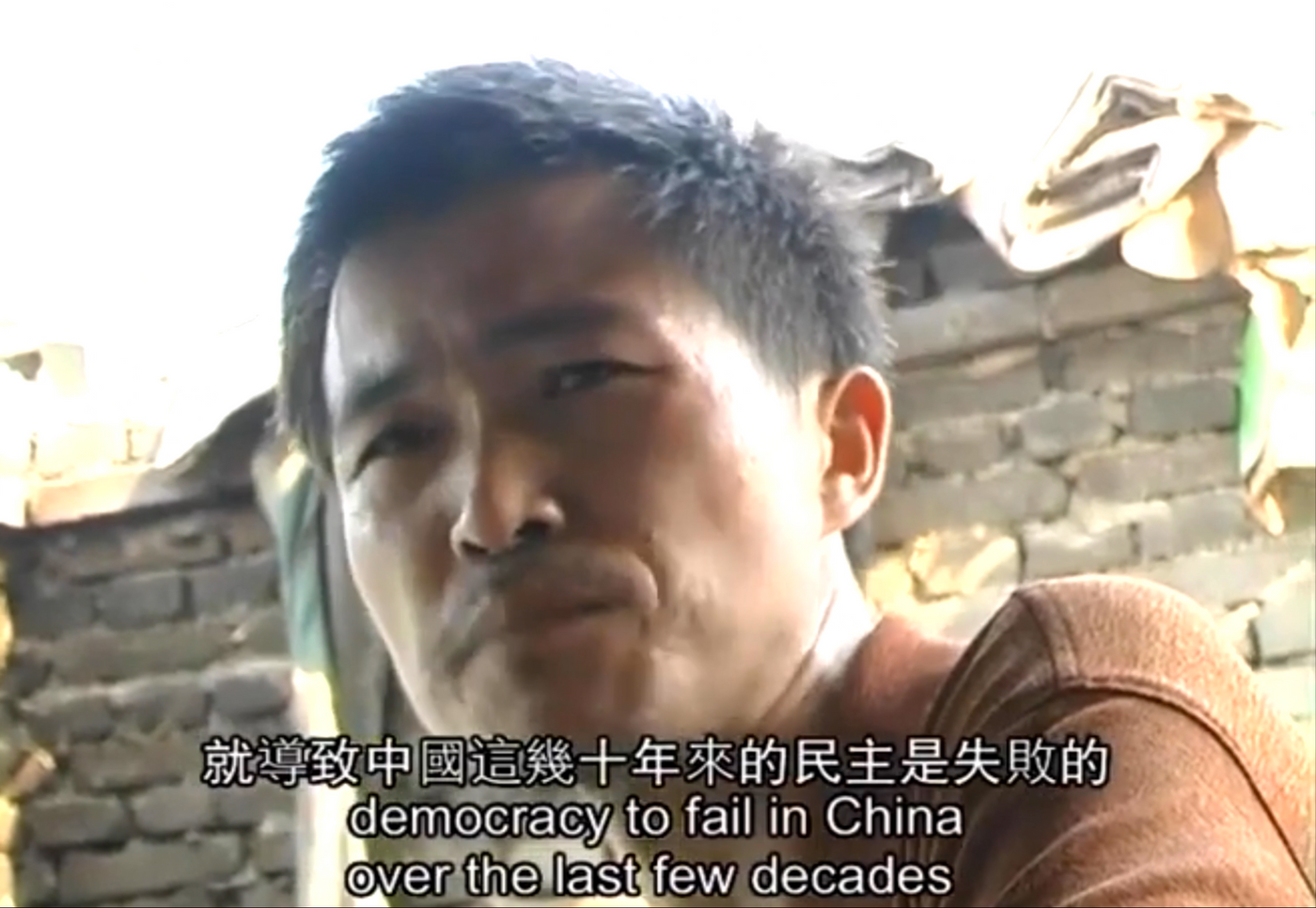
When Hu and Wen took office in 2003, because of the disclosure of information during the SARS period, the accountability of senior officials, and the abolition of the detention and repatriation system at the beginning of his administration, people were once full of hope for the "Hu-Wen New Deal". Human beings will reflect, and China will be reborn. We will have a more responsible government, a more transparent speech environment, and more dignified citizens. However, the above imagination never happened, and the reality is running wild in the opposite direction. In less than a year, the government has lied more recklessly, and has done everything possible to prevent the spread of the truth. Beginning with the purge of Southern Metropolis Daily, which reported on the SARS and Sun Zhigang cases, the authorities have gradually cracked down on investigative journalists, human rights activists and human rights lawyers.
At this time, many citizens who are social activists realized that images can be widely disseminated on the Internet as evidence, so the 2.0 version of independent documentaries and citizen images came into being. In version 2.0, those who picked up cameras were no longer limited to independent documentaries. Many activists themselves took up cameras. The motivation for creating such images may not stem from aesthetic considerations, but rather the shooting of independent documentaries as a direct political action, and the screening of such images mostly relies on the Internet for public dissemination. In 2006, Hu Jia filmed "Prisoner of Liberty City". Hu Jia is a social activist who has long been concerned about environmental protection, AIDS, and human rights issues. In 2007, she was arrested for "inciting subversion of state power". "Prisoner of Liberty City" was filmed during the more than 200 days he was placed under house arrest by Tongzhou State Security in August 2006 before he was formally arrested. Unable to leave the house, Hu Jia had to observe the state security guards who were stalking downstairs from the window, like a prisoner watching the absurd drama rehearsed by the prison guards. Hu Jia used the camera to subvert the power of watching and being watched. At the end of the film, Hu Jia asked the camera, "House arrest or house arrest, stalking or being stalked, who is less free? Who is the real prisoner of BoBo Liberty City?"
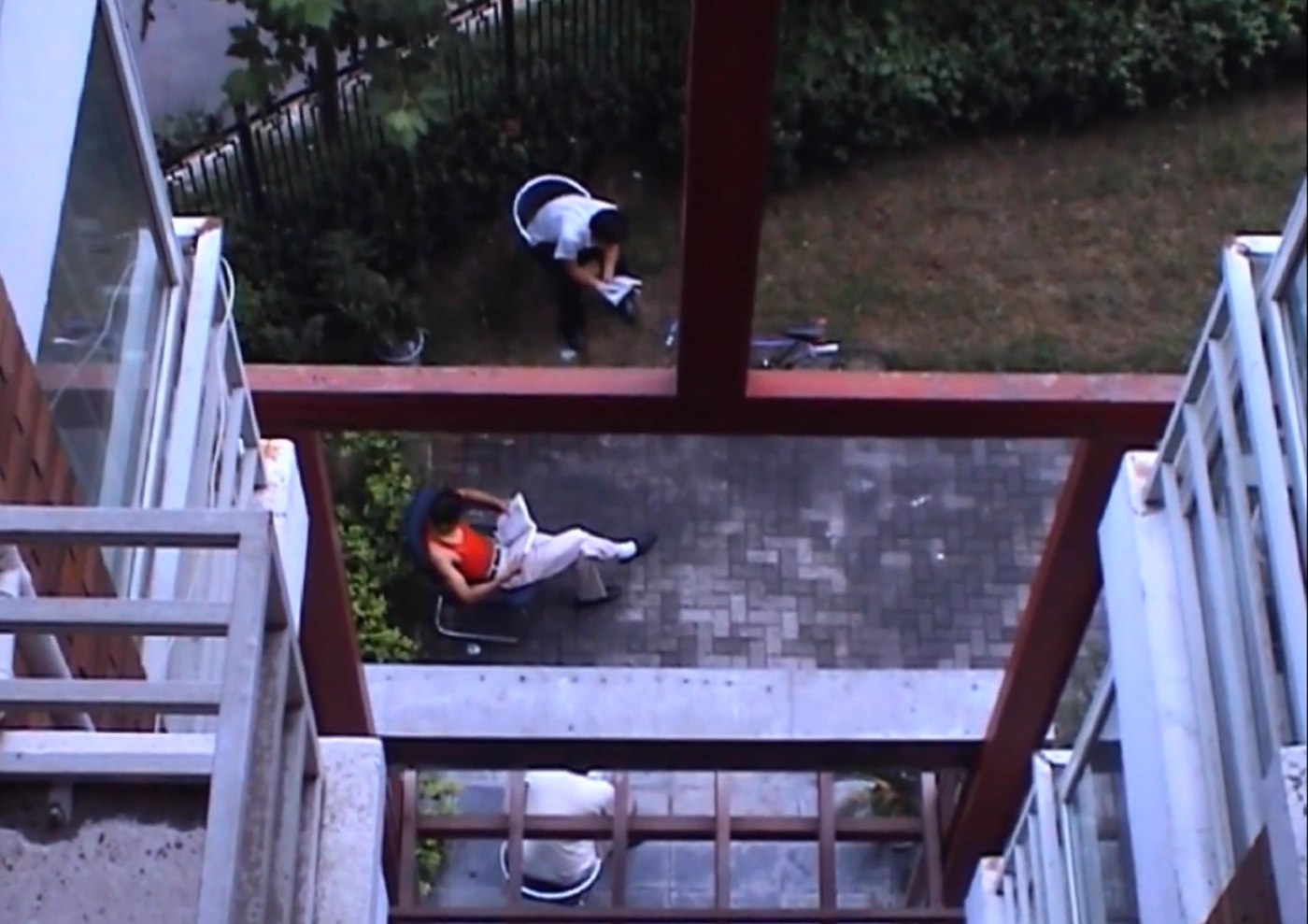
In the early days, the official understood independent documentaries more from the perspective of cultural control, and only regarded independent documentaries as a type of documentaries different from documentaries within the system and documentaries from TV stations. Therefore, in the early official process, if there are "problems" in independent documentaries, it is usually just the film bureau to talk to the film's director and producer. When a part of independent documentaries began to actively pay attention to the struggles at the bottom, as evidence to witness a civil society that was born weak but strong, and tried to participate in the civic movement on the Internet, the government began to politicize independent documentaries and even independent films, as a way of "Political issues" rather than "film issues" to re-examine independent films. How the image itself is no longer important to the official, what matters is the power of the image in the process of dissemination. Around 2010, the pressure on a certain documentary or a certain film festival turned into a systematic suppression of independent films by the government.
At this time, independent documentary creators such as Ai Xiaoming, Teng Biao, He Yang, Wang Lihong, and Hua Ze who tried to use documentaries to witness history and participate in social change, the two identities of "social activists" and "documentary video workers" were in their hands. Two in one. Video became a weapon for the disenfranchised in an authoritarian state, and the 3.0 version of independent documentaries and citizen video was born. A typical example of the qualitative change in version 3.0 is Ai Weiwei's activism images. In 2009, Ai Weiwei's team traveled to Chengdu to testify in order to assist the "Tan Assassin Case", during which they experienced illegal obstruction and violent intervention by the Chengdu police. When the police took Ai Weiwei from the hotel , Ai Weiwei raised his mobile phone and pressed the shutter on the elevator. Under the reflection of the metal material of the elevator, in the photo, in addition to Ai Weiwei himself, there were also images of Zuo Xiaozu and the two policemen who were traveling with him. The sudden flash of light caught everyone off guard. , but no one, including Ai Weiwei, expected that this photo would go down in history because Ai Weiwei tweeted it. The German magazine Der Spiegel commented on this photo as "the most important image since the mobile phone revolution, and its image is as important as Da Vinci's "Mona Lisa" and Picasso's "Guernica". This comment is somewhat overstated, but Ai Weiwei did show the world that it is possible to use video and the Internet to fight tyranny.
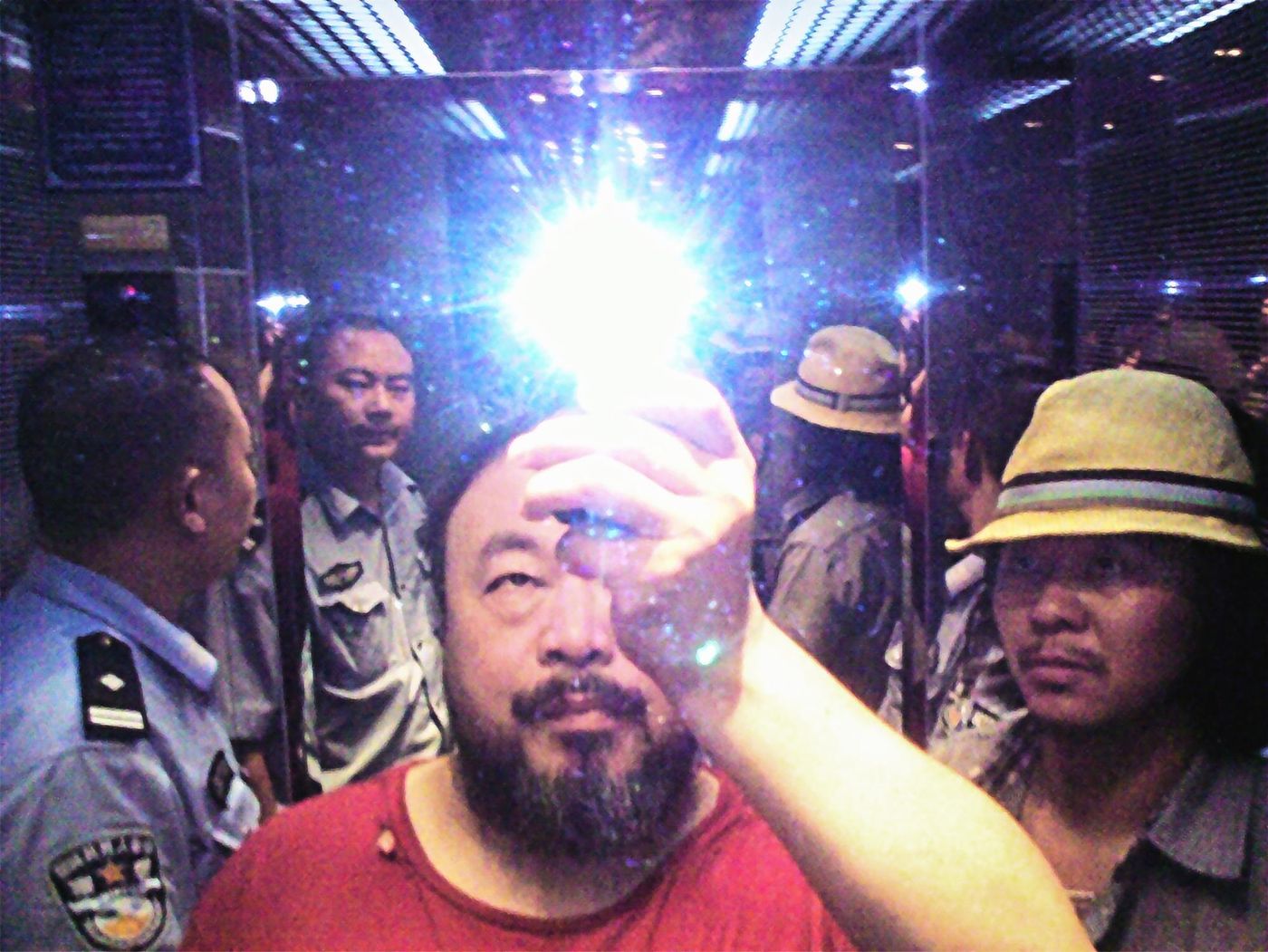
2011 was the "golden age" of Weibo. At that time, Sima Nan and others were still Sima Chuckou. At that time, "public knowledge" was not a derogatory term. At that time, as an ordinary netizen, I also went to Dongshi Ancient Village to participate. In order to rescue Chen Guangcheng, the popular topic on Weibo at that time was "Crowd Watching Change China". Today, those accounts, those images, those memories, and even those people are gone. The interventional activism images such as "A Lonely Man", "Beautiful Face", "Deep Regret", and "Beautiful Life" were filmed back then. Ai Weiwei, who has also left China and is no longer filming related issues. According to Zhang Zanbo's interview with him, he explained, "Why don't I go and reason with a cow, that's not impossible, but it became a symbol, a ceremony, and that wasn't my intention. I filmed those events at the time. , I just want to publish it for everyone to judge. But... the Chinese public does not have a strong sense of right and wrong, who should I show those things to?”⑫ This response may have its reasons, but my personal position is more Approaching " Don't wait for the world itself to improve, but use your own strength to participate in that world, or at least express our views on it ". No matter what point of view one holds, the "golden age" of Weibo and independent documentaries is long gone. As a younger generation, while I feel sorry for it, I also don't understand that those are just using immature film language to express my thoughts. , and even sometimes just record the reality, why did the last one become the "enemy of the state" ?
3. The third stage: 2012 - the "darkest hour" of independent documentaries after Xi Jinping took office
In the third stage, the living conditions of independent documentaries in China have deteriorated sharply. Obstruction of filming and screening has become the norm. In some cases, there are even extreme cases where participating directors are beaten and video workers who shoot independent documentaries are detained. Although this stage basically coincides with the time of Xi Jinping's presidency, the suppression actually started at the end of Hu and Wen's reign. Teacher Zhang Xianmin said, "The collective escalation of pressure in the independent film field in 2012 is not accidental, but will come sooner or later." ⑬ On the one hand, the relevant departments have been paying attention to independent films for a long time, and around 2012, it was only a concentrated outbreak of pressure; On the one hand, those human rights activists, investigative reporters and human rights lawyers are all "functionally extinct" in front of independent filmmakers, and the sky is falling and tall people are holding it up. Finally, in 2012, independent filmmakers also became those who "stand up for the sky".
In 2012, the 9th "China Documentary Exchange Week" and the 7th "Beijing Independent Film Festival" were merged into the 9th "Beijing Independent Film Festival". The film festival opened on August 18, with more than 500 audiences. However, in less than half an hour after the opening film was shown, the public security department turned off the switch of the Songzhuang Original Art Center. The opening film "Egg and Stone" came to an abrupt end in darkness. The film was originally an insensitive drama. , but after the action of the relevant departments, the title of "Eggs and Stones" is more symbolic - the egg meets the stone. After the switch was opened, the public security department claimed that the film festival had "safety issues", and the curatorial team argued for it. Jia Zhangke joked on Weibo at the time, "It seems that the Film Bureau and the Power Supply Bureau are working together. If I switch to shadow puppetry another day, shouldn't the fire department also take care of it?" A "notice" was written by hand at the main entrance, "According to the notice from the relevant government leaders, the "Ninth Beijing Independent Video Exhibition" will be closed ahead of schedule today. Notice hereby. "Although there is an inconspicuous typo in the notice, what is more interesting is that the notice for the suspension of the "China Modern Art Exhibition" in 1989 was also written by Li Xianting himself, and now he is forced to write "Beijing Independent Video" on his doorstep. 23 years have passed, the leadership has been rotated several times, but the political environment and creative environment have not improved in the slightest. Fortunately, the "Beijing Independent Film Festival" has rich "struggle experience" over the years. There are policies above and countermeasures below. The staff and audience of the film festival are like guerrillas, putting a movie to another venue, and finally working in Songzhuang for many contemporary artists. The screening was completed in the hiding place of the room.
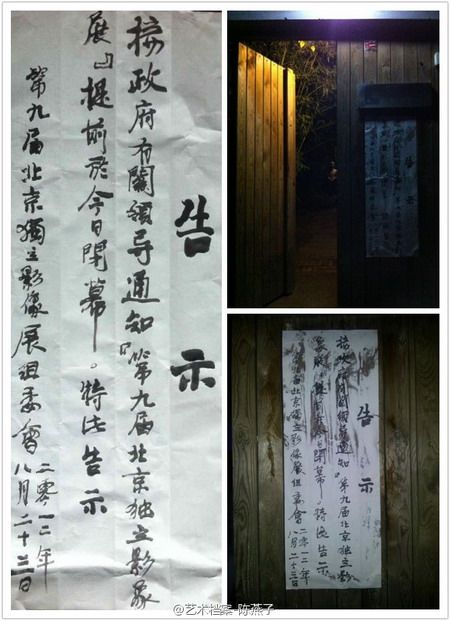
The harassment suffered by the ninth "Beijing Independent Film Festival" is not an isolated proof that the entire independent film industry has been systematically suppressed since 2012. The 9th "China Independent Film Festival", which does not directly confront relevant departments, although many plans have been made to try to avoid risks - the focus of the film festival is on experimental images that are closer to contemporary art; the introduction of "Dragon Label Film" attempts to reconcile the film festival. The independent temperament of the film; cooperation with local colleges and universities, hoping to use colleges as a buffer - but all efforts are destined to be futile in the face of the power determined to purge independent films. Before the launch, the co-organizers were notified by the relevant departments that they were officially ordered not to cooperate with the "China Independent Film Festival", and even the "Dragon Mark Unit" of the film festival was prohibited from showing. Cao Kai, chairman of the "China Independent Film Festival", tried to move the screening to universities and private art spaces, but also ended in failure under the tracking call of the relevant departments, so Cao Kai could only regretfully announce the "event" two days before the opening of the film festival. "Postponed", but anyone with a discerning eye can see that "postponing the event" is just a euphemism for "forced to stop".
Compared with Beijing and Nanjing, Yunnan is more "the sky is high and the emperor is far away." However, "there is no king under the sky." Although it is slower to be affected by political radiation, what should come will always come. In March 2013, the 6th "Yunzhinan Documentary Video Exhibition" was submitted to the relevant authorities for many times but failed to get a reply, so the curator Yi Sicheng temporarily moved the screening city from Kunming to Dali. However, all the screening institutions in Dali They all received a ban from the relevant departments, and the directors who came to Dali had no choice but to show the film on a private computer in the hotel where they stayed. Afterwards, not only was this "South of the Clouds" forced to be cancelled, but the entire "South of the Clouds Documentary Exhibition" was also completely suspended. Hao Jian, a former professor at the Academy of Film, analyzed that this is because the film festival "touches the history of the authorities' tailoring and the reality of obscurity." Video Exhibition” and “Yunzhinan Documentary Video Exhibition” suffered heavy losses in 2012 and 2012, and the regular screening activities of some folk independent documentaries were also hindered. In 2013, teacher Zhang Xianmin said in an interview with The New York Times, “2012 is the “Year of Forced Demolition” of independent video in China. The first year of forced demolition."
It was not only the film festival that was "forcibly demolished", but also the "Li Xianting Film School". "Li Dian" is the only training institution in China that teaches independent film. Its main promoters are teachers Zhu Rikun and Wang Hongwei. They hope to spread independent film culture and cultivate independent film talents through training. I studied at the Beijing Film Academy for four years as an undergraduate, and also took a two-month training course at the "Li Xianting Film School". The film school claims that they are "the place where dreams begin", and they want to "build buildings and make blockbusters". In fact, it tries to train qualified practitioners in the Chinese film industry and train the screws in the assembly line.

The school motto of "Li Dian" is "the spirit of freedom, independent thinking, and the ability to practice". What it tries to convey is a sense of social responsibility, as well as "what can images be?", "where can you use images to reach?". In "Li Dian", I was fortunate to get to know such good teachers and friends as Cui Zien, Wang Hongwei, Wang I, and Zhang Zanbo, but the important thing was not what specific guidance they gave me in academic and practical aspects, but through them, I saw A group of middle-aged people who "do not devote themselves to wealth and honor, and do not care about poverty and lowly" have seen the possibility of another life and a spirit of "doing it when they know it cannot be done". "Success", but they chose a long and even dangerous path, all of which stemmed from their belief in justice and their responsibility to history.
A self-organized independent film community like "Li Dian", which gathers like-minded people, will undoubtedly be regarded as a thorn in the side of the CCP's atomization policy. So it is not surprising that on July 6, 2013, the ninth "Li Dian" students came to Songzhuang from various places to report, they were told by the police guarding the door that "the institution has no training qualifications" and "training is banned" . That night, 30 or 40 police officers rushed more than 20 students into a minibus like a close contact with the new crown, and then forcibly pulled them to the Hongqi Hotel in Tongzhou District. In the early morning of the next day, the police took the trainees to the train station, dispersed them and repatriated them, and threatened the trainees that the training was "serious". However, no matter how bluff the police made, not only did the practitioners leave Beijing, but they even posted the incident on Weibo, attracting many independent filmmakers and contemporary artists to forward it. After the fermentation, Southern Metropolis Daily and Southern Weekend also reported . Afterwards, under the coordination of "Li Dian", everyone completed the training in a remote farm in Hebei. Obstruction by the police is probably the best "first lesson in school". Everyone has experienced the living conditions of independent films in China, and they are more aware of the reasons for creating independent films.
The experience of "Li Dian" is the epitome of the official systemic crackdown on independent films in the eventful autumn of 2013-the "Yunzhinan Documentary Video Exhibition" was forced to close in March of the beginning of the year, and then the "Video Investigative Reporter Workshop" was also called off. On the day that the students of "Li Dian" were repatriated, the private screening organized by Hunan director Mao Chenyu in his own home with only a dozen people was also canceled. In the end, even the official publication that passed the censorship and obtained the ISBN was released in Ullens. The sale of the Contemporary Art Center has been blocked by the authorities, simply because the content of the series involves independent images.
As the highlight of independent films, the film festival is naturally doomed. Before the opening of the 10th "Beijing Independent Film Festival" in 2013, the various points of the film festival - Beijing's Phenomenal Art Center, Heavy Taste Film Festival, Yuandian Art Museum, Original Art The museum, even the movie fan kindergarten in Tianjin and the cylindrical screening in Shenzhen were harassed by the public security department, and the screening was banned. The rumours of the grassroots police officers are fabricated, or Qincheng has evidence to test, in short, the 10th "Beijing Independent Video Exhibition" "related to Bo Xilai" had to be completely transferred from the semi-underground after losing all the screening venues. On the ground floor, it was finally changed to the internal screening of the "Li Xianting Film Fund". The 10th "China Independent Film Exhibition" in Nanjing also moved the experimental film, short film and dragon label units to Xiamen and the documentary unit to Dalian under various pressures. These geographical and spatial movements symbolize the increasingly marginal situation of Chinese independent films. In the confrontation with power, independent films have always been "terrorists" in the eyes of power, and have always been the absolute weakest party. This also reflects the fact that the living space of independent films and civil society in China has not only not changed in any positive way in the past two decades, but has even deteriorated.
In the 11th "Beijing Independent Film Festival" in 2014, the relevant departments were no longer satisfied with the power outage. They directly arrested Li Xianting and Wang Hongwei, the directors of the film festival, and brought in a group of hooligans to block the gate of the "Li Xianting Film Fund". , prohibiting staff and directors from entering and leaving, and even beating directors and audiences who came to participate in the exhibition. When Director Geng Jun, who was beaten, went to the police station to report the case, he discovered by chance that the "gangsters" who beat and directed the beatings were actually the policemen of the police station. The documentary "A Film Festival Without Films" directed by Wang Wo is about the absurd stories encountered in this film festival. The material of the film is not only the co-creation of several independent filmmakers, but also completed by the police and the national security guard. . Zhang Zanbo, an independent documentary filmmaker who filmed "There is a Kind of Peaceful Call" and "The Road to the Sky" once said, "In a country with free expression, the relationship between the police and the film often only occurs in the film; in a country where free expression is strictly restricted, the In authoritarian countries, the relationship between the police and the film often happens outside the film. A true artist should have the courage to find light in the dark, and the ability to find freedom where there is no freedom.”
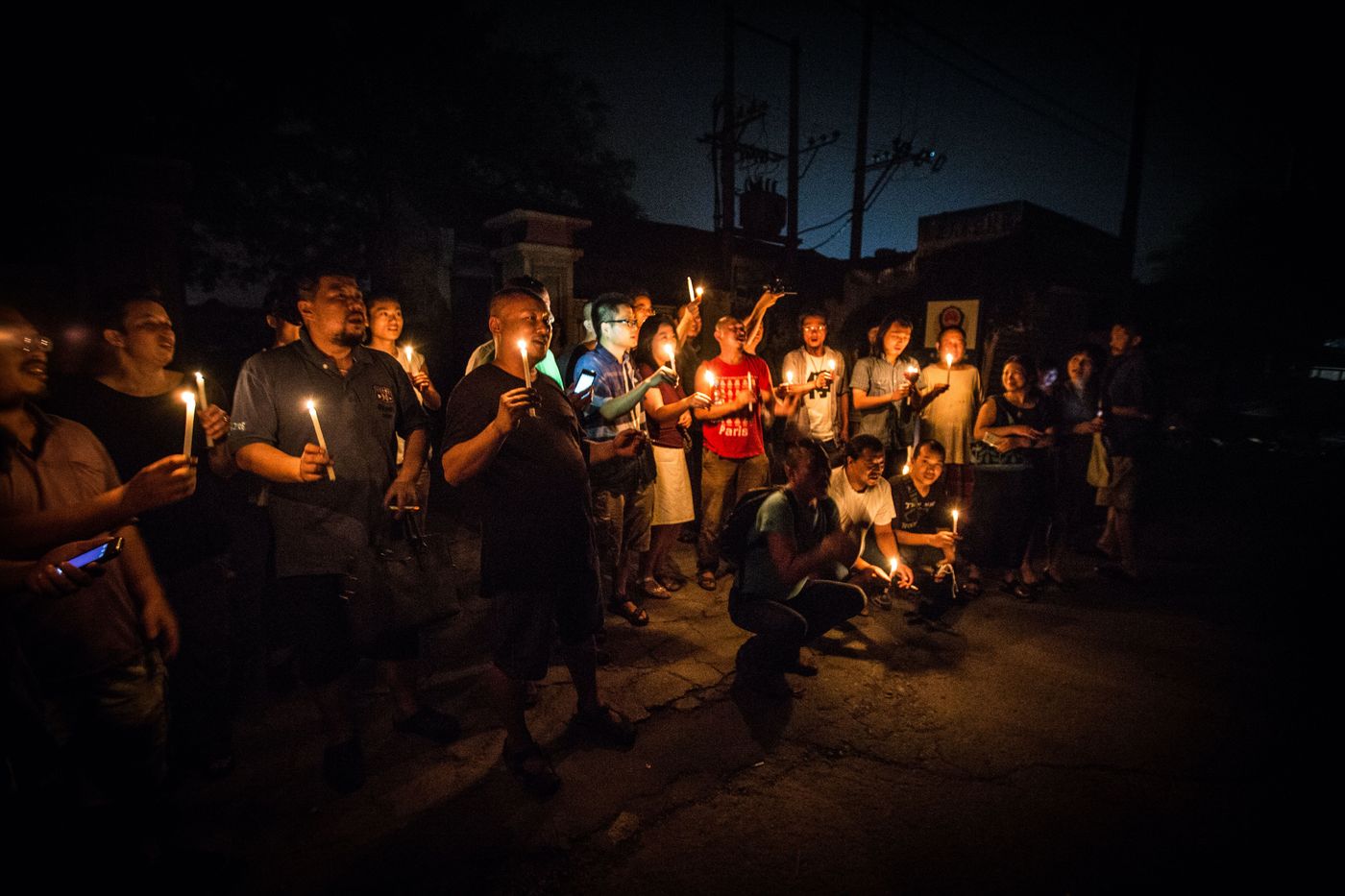
Under the rubble of the film festival being demolished, some "broken flowers" still bloom. In 2014, "Aiku Film Week" tried to transfer the screening to the train. The organizing committee of the film festival helped the director to buy the tickets, and informed the audience in advance of the number of trains. With the accompaniment, I watched one exhibit after another.

In 2015, 2016 and 2017, the pressure of various independent film festivals in China was further escalated. The "China Independent Film Festival" was exiled to Beijing, and the "Beijing Independent Film Festival" was exiled to Hebei. These two independent film festivals with cultural missions were forced to Divided into multiple sections, it can only maintain a minimum existence in the form of "multiple venues + daily screenings"⑯. The 14th "China Independent Film Festival" in 2018 is the last year for the film festival to be screened. The organization of the film festival is like the poster of this film festival, showing a stubborn despair.
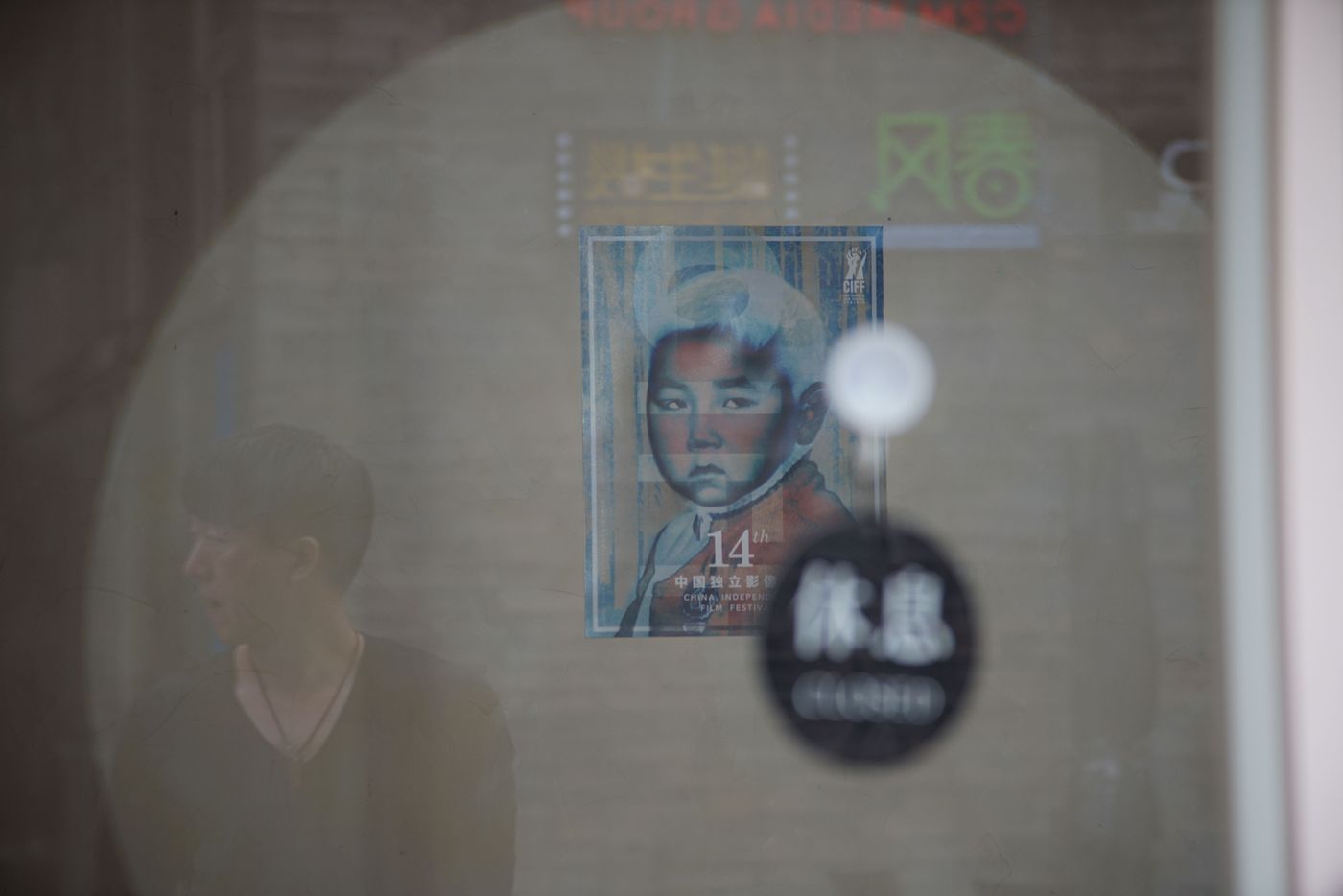
Everyone on the organizing committee could not tell what role it was to maintain an independent film festival relying on love and faith in this social environment, but a sense of mission pushed everyone to do it. I don’t know if it’s a psychological hint from this atmosphere. The few photos I took casually back then seem to be full of metaphors today. There are still a group of people shining in the dark, but it seems that there are several pairs of eyes watching. follow them.
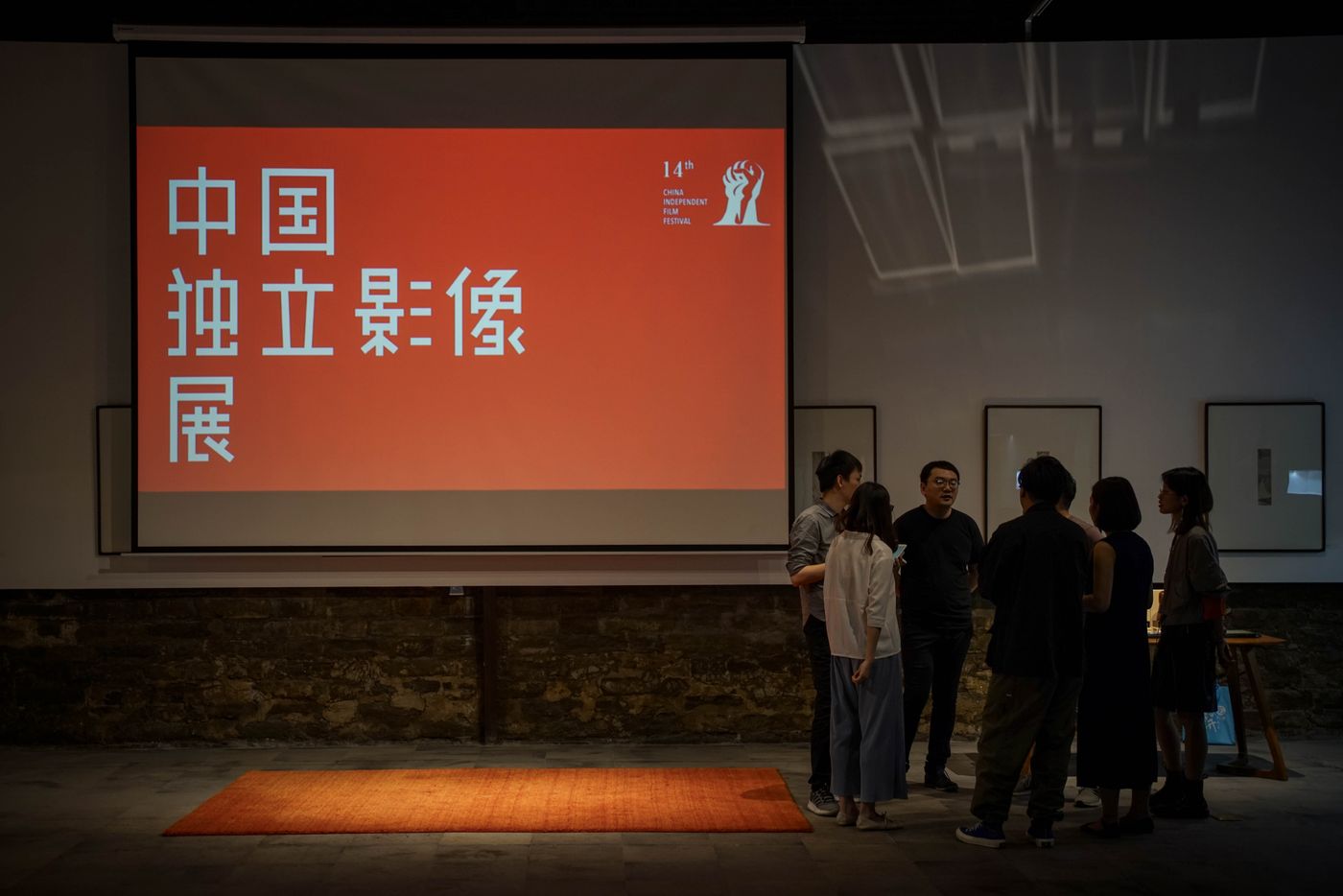
The film festival closed on June 3. The staff sent off the audience and packed up the equipment. By the time they left the venue, it was past midnight, which happened to be June 4. I suggest that everyone go to the square - the dark square is full of light green armed police and white plainclothes, and under every lantern there are cameras. After witnessing this situation, I will leave completely after a few months. China.
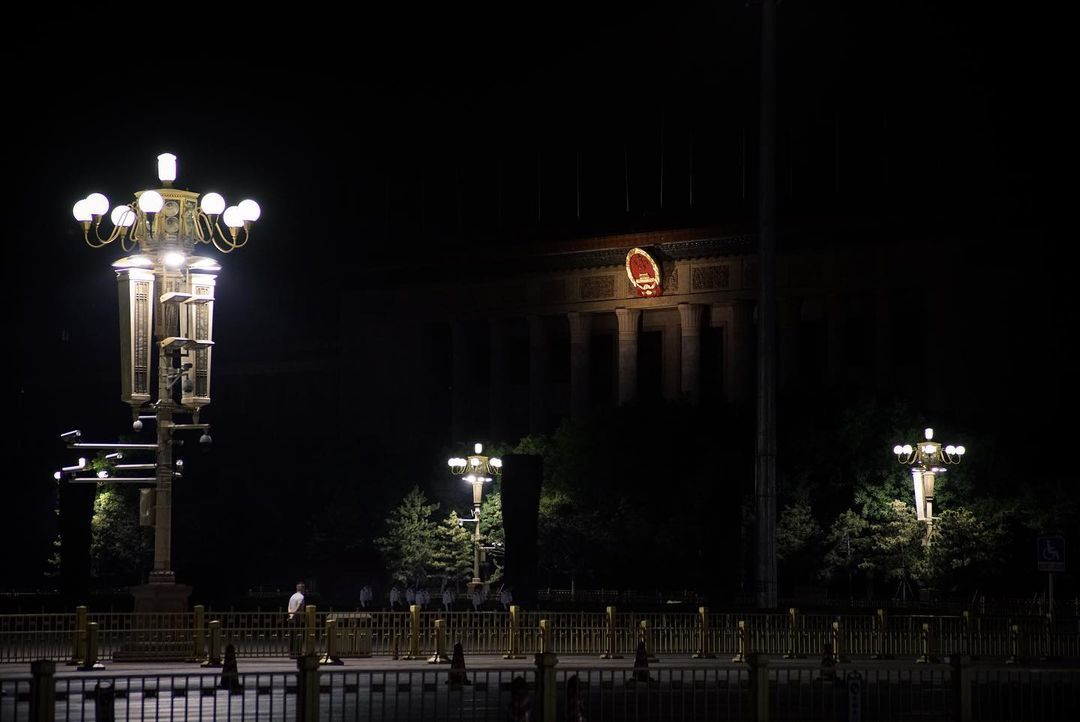
end
Looking back at the inception of Chinese independent documentaries, its origins did not stem from artistic explorations, but rather the expression of the spirit of "speaking the truth" in the 1980s in the documentaries, which was a reflection of the "greatness" promoted by ideology. Reactionary, the documentaries of the year may not have had too much political demand, but in the era when the 1989 pro-democracy movement had just ended and the whole society was in full swing, “any voice from the unofficial system would be regarded as the sound of freedom and sung around the world”⑰. The founder of the independent documentary, Mr. Wu Wenguang, said, "The rise of our generation is due to the absence of the gods." It is because of the state-run studios and the State Administration of Radio, Film and Television that these documentaries are "independent"; the stricter the censorship, the more documentaries are considered "independent"; as long as cultural controls remain in place, there will always be New independent documentaries appear . The development of independent documentaries is highly consistent with the pursuit of modernity in contemporary China, and the prosperity of independent film festivals is also a barometer of the official social control.
We are fortunate to witness an era of democratization of images, and we are also fortunate to get to know those who shoot works that reflect the values of idealism and modernity with the spirit of independence and free thinking. Quitting a job and saving up just to devote yourself to an unrealistic ideal is undoubtedly a luxury for Chinese people, because they have to face not only economic pressure, but also family and social pressure. look. But over the past 30 years, there has been such a group of people from all over the world who came together for no apparent reason. Under pressure unimaginable to ordinary people, they used their flesh and blood to tear open the Iron Curtain, and under the impermeable official ideology , open up a space for free expression. The actions of each individual together make up the history of the independent documentary and the future of civil society. At this moment, documentaries are not just documentaries, but actions; film festivals are no longer film festivals, but events .
The years that these independent documentarians have fought, we may have forgotten, and many people may not even know. But independent documentaries are themselves a social movement to grab public memory. CNEX once had a slogan that borrowed the title of Calvino's book, "A Memo to the Next Generation of Peace and Prosperity". Documentary is the memory of the times. As long as someone is still telling it, history will not be completely erased and will not be covered by the so-called "correct" memory. They try to control history and therefore control the future, and all we can do is tell our own stories as much as possible. Looking back on the past, we are the characters in history; looking forward to the future, we can also be the creators of history .
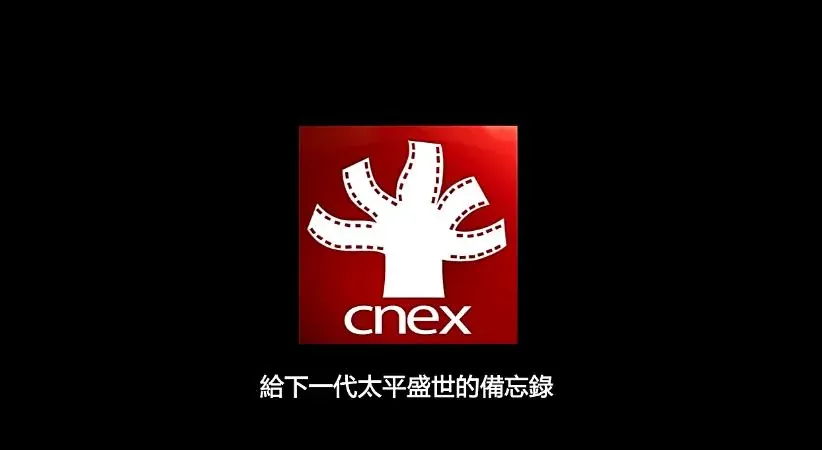
Film is different from other art media. Because of the existence of the screening process, film itself is a part of popular culture and public affairs, and film itself is political. It is politics to follow one's own way, politics to join forces with others, politics to compromise and concessions, and politics to trade violence for violence. Godard (Gundard) took this a step further, saying that "political films are not about making films about politics, but making films politically, and making films about politics." Like other art forms, film itself is constantly interfering in politics. Until politics stops trying to intervene in the film. Any art form may decline with the passage of time. Maybe even the medium of documentary will be eliminated by the times in a few years, but the spirit of "speaking the truth" of independent documentaries, that "knowing that you cannot do it" The spirit of "zhi" will always be floating in the wind until they find the next new artistic carrier. Independent documentaries are the pursuit of freedom, and the artistic practice and bloom of the idea of freedom and the spirit of independence.
Salute to the "Beijing Independent Film Exhibition", "China Independent Film Exhibition", to Chinese independent documentaries, and to all past and future Chinese independent documentarians. The future is always the future, and the future is still in the future.
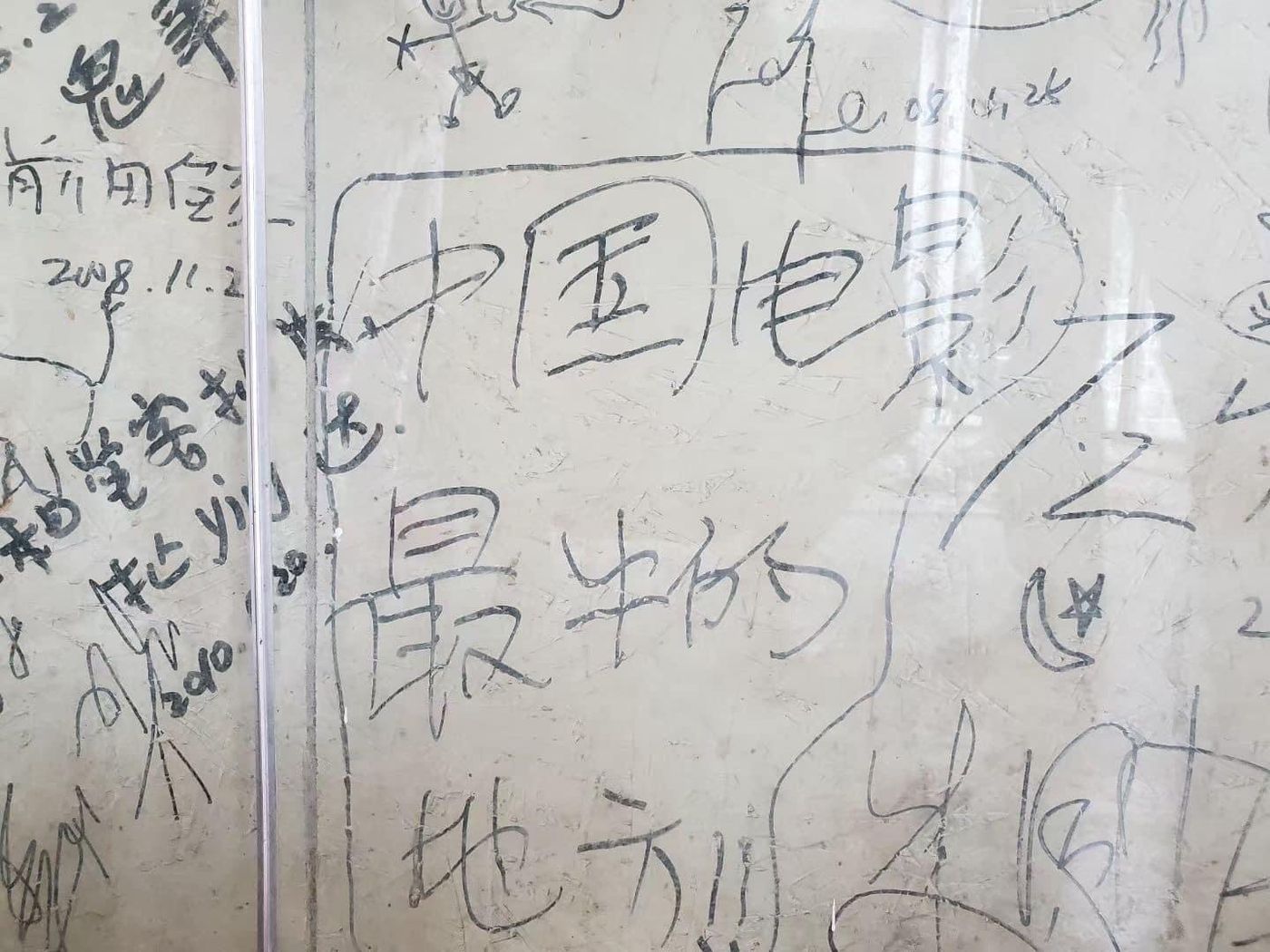
Direct quote:
① "Independent Films, 20 Years from "Underground" to "Forbidden Exhibition", Zhang Xianmin, 2013
② "Oxford Film Manifesto", https://fanhall.com/group/thread/24618.html , 2011
③ "Chinese Documentary Video: Establishing a New Independent Cultural Tradition", Wang Xiaolu, 2021
④The Complete Manual of DV—A Person's Image, Zhang Xianmin, Zhang Yaxuan, China Youth Publishing House, 2003
⑤ "Practice Society", Wang Xiaolu, 2010
⑥ "A Brief History of Chinese Independent Film Festivals", Zhang Xianmin, 2014
⑦ Same as ⑤
⑧ "Gaze of Exile", Huang Wenhai, Tendency Press, 2016
⑨ Same as ⑧
⑩ Same as ⑧
⑪ Same as ⑥
⑫ "Ai Weiwei on Documentary: Documentary is Often Used as Evidence", Zhang Zanbo, 2017
⑬ Same as ①
⑭ "Who "killed" the "Yunzhinan Documentary Video Exhibition"? ", Deutsche Welle, 2013
⑮ "China's Independent Video "Forced Demolition Year", Zhang Xianmin, New York Times Chinese website, 2013
⑯ "Purpose" and "Presence": An Overview of the 13th Beijing Independent Film Festival, Liu Bing, "Film Author", Vol. 16, 2017
⑰ "Chinese Independent Documentary Archives", Zhu Jingjiang, Mei Bing, Shaanxi Normal University Press, 2004
References:
The Exiled Gaze, Huang Wenhai, Tendency Press, 2016
"Independent Records: Dialogue with China's Emerging Directors", Zhu Rikun, Wan Xiaogang, Shaanxi Normal University Press, 2004
The Complete Manual of DV—A Person's Image, Zhang Xianmin, Zhang Yaxuan, China Youth Publishing House, 2003
Archives of Chinese Independent Documentaries, Zhu Jingjiang, Mei Bing, Shaanxi Normal University Press, 2004
"Compilation of Chinese Independent Documentary "Nanjing Declaration" Event Documentary, CIFF Organizing Committee, 2011
Artistic Power, Boris Glois, Jilin Publishing House, 2016
Records and Methods, edited by Wang Chi and Brian Winston, China International Broadcasting Press, 2014
"Recording China: The New Documentary Movement in Contemporary China", Lv Xinyu, Sanlian Publishing House, 2003 (The New Documentary Movement was a concept proposed by Lu Xinyu, and Wu Wenguang and others did not buy it)
Independent Landscape Documentation Project
Chinese Independent Video Archive
"The Growth Space of Independent Documentaries in Mainland China", Cui Weiping
"The History of China's Post-90s Banned Films", Zhang Xianmin
"The Main Body Emerges: Twenty Years of Observations on Chinese Independent Documentaries", Wang Xiaolu
On the Ruins of Utopia: The New Documentary Movement in China, Lv Xinyu
Like my work? Don't forget to support and clap, let me know that you are with me on the road of creation. Keep this enthusiasm together!









- Author
- More